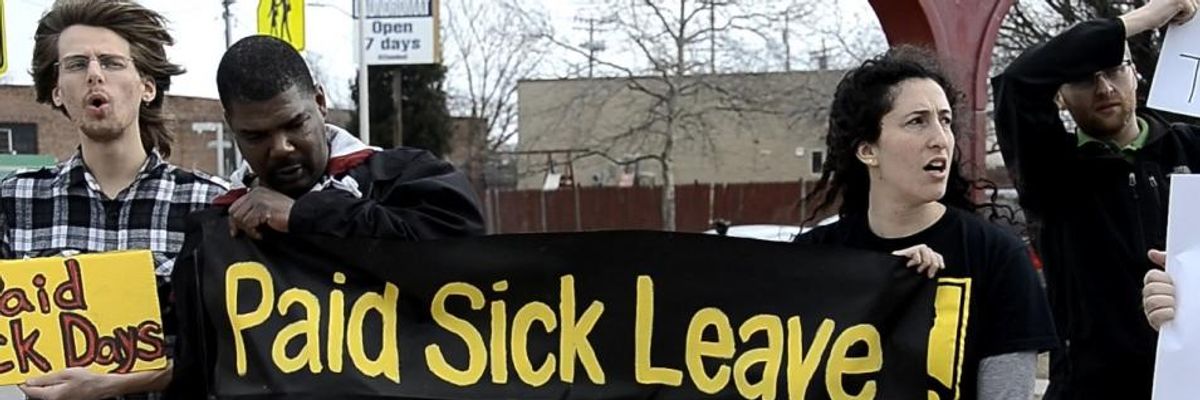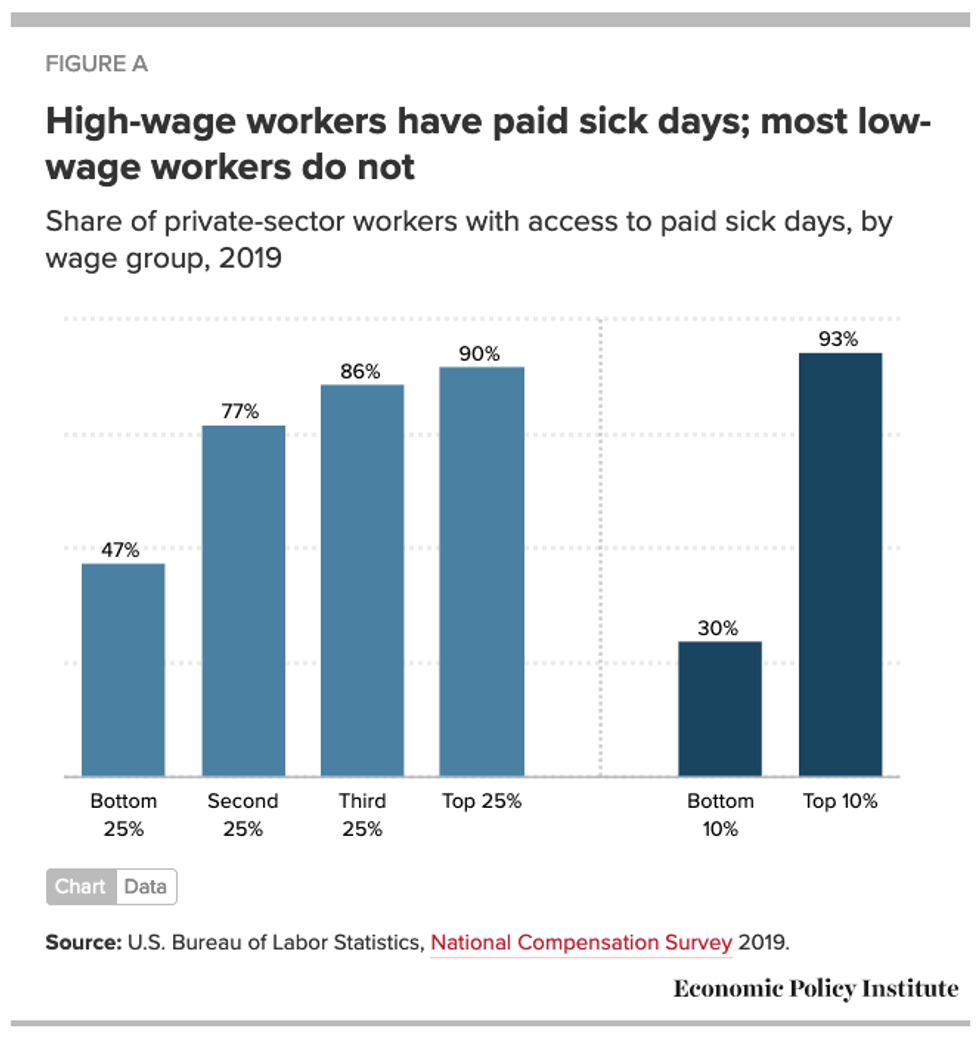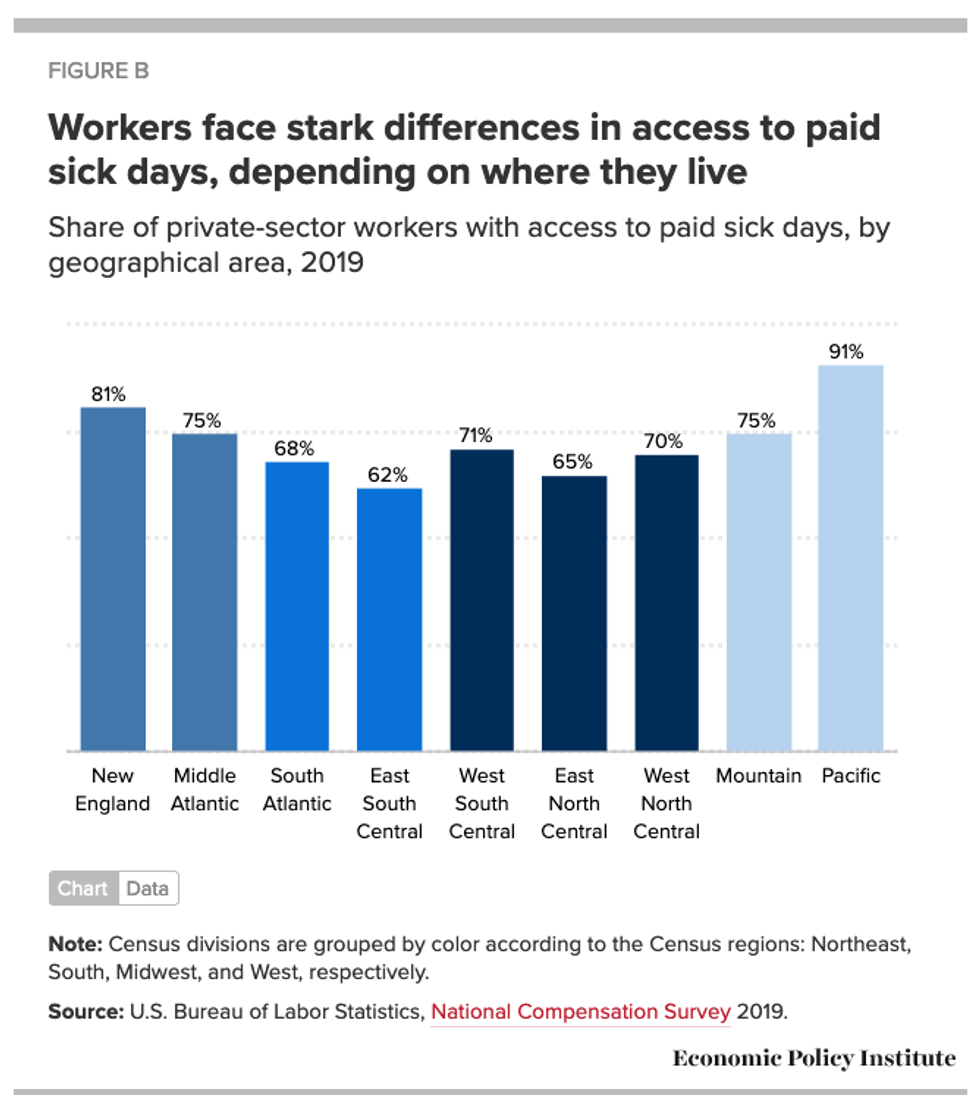

SUBSCRIBE TO OUR FREE NEWSLETTER
Daily news & progressive opinion—funded by the people, not the corporations—delivered straight to your inbox.
5
#000000
#FFFFFF
To donate by check, phone, or other method, see our More Ways to Give page.


Daily news & progressive opinion—funded by the people, not the corporations—delivered straight to your inbox.

Protesters in 2015 rallied outside a Wendy's in Baltimore in support of The Healthy Working Families Act which would require businesses with 10 or more employees to provide up to seven paid sick days a year. (Image: Kim Hairston/Baltimore Sun)
COVID-19--commonly known as the coronavirus--is now a potential threat for the United States and we all "need to be preparing for significant disruption of our lives," warned the Centers for Disease Control and Prevention (CDC) this week.
Unfortunately, preparing for the "significant disruption" will be economically unimaginable for one group of Americans--the millions of people in the United States who do not have access to paid sick days or have health insurance with a regular health care provider.
The CDC released very clear instructions to help prevent the spread of respiratory diseases, including staying home when you are sick. Not everyone has that option.
Overall, just under three-quarters (73%) of private sector workers in the United States have the ability to earn paid sick time at work. And, as shown in the figure below, access to paid sick days is vastly unequal. The highest wage workers are more than three times as likely to have access to paid sick leave as the lowest paid workers. Whereas 93% of the highest wage workers had access to paid sick days, only 30% of the lowest paid workers were able to earn sick days. In this way, access to paid sick days increases with wages among workers, disproportionately denying workers at the bottom this important security. And, low-wage workers are more likely to be found in occupations where they have contact with the public--think early care and education workers, home health aides, restaurant workers and food processors. When workers or their family members are sick, they shouldn't have to decide between staying home from work to care for themselves or their dependents and paying rent or putting food on the table. But, that is the situation our policymakers have put workers in.

Meaningful paid sick leave legislation is incredibly important for low-wage workers and their families and important to reduce the spread of illness.
The ability for workers to earn paid sick days varies greatly across the country. In lieu of federal action, many states have passed legislation to guarantee paid sick days, but many workers have been left behind. The figure below shows vast differences across Census divisions in the ability for workers to use paid sick time to take care of themselves or their family members. The share with access to paid sick days ranges from only 62% in East South Central United States (composed of Alabama, Mississippi, Kentucky, and Tennessee) up to 91% in the Pacific (California, Oregon, and Washington). Notably, many local municipalities in the East South Central region have been preempted by their state governments from passing paid leave and sick day policies.

The second recommendation from the CDC is to contact your healthcare provider.
We know in that the United States, millions of people delay getting medical treatment because of the costs. The latest Census numbers tell us that over 27 million people in this country are uninsured, up nearly two million over the previous year. These trends are moving in the wrong direction, notably because of losses in Medicaid coverage. Without health insurance, many do not have a regular source of care and simply won't go to the doctor to get the attention and information they need to not only get better but reduce the spreading of disease.
The CDC recommendations all seem well and good but how does someone with no paid sick days or insurance cope?
Luckily, policymakers can choose to act. Federal legislators can require employers to provide paid leave for workers to stay home when they are sick, as many states have done. And, policymakers can finally pass legislation that gives everyone the right to affordable health care when they need it.
Dear Common Dreams reader, The U.S. is on a fast track to authoritarianism like nothing I've ever seen. Meanwhile, corporate news outlets are utterly capitulating to Trump, twisting their coverage to avoid drawing his ire while lining up to stuff cash in his pockets. That's why I believe that Common Dreams is doing the best and most consequential reporting that we've ever done. Our small but mighty team is a progressive reporting powerhouse, covering the news every day that the corporate media never will. Our mission has always been simple: To inform. To inspire. And to ignite change for the common good. Now here's the key piece that I want all our readers to understand: None of this would be possible without your financial support. That's not just some fundraising cliche. It's the absolute and literal truth. We don't accept corporate advertising and never will. We don't have a paywall because we don't think people should be blocked from critical news based on their ability to pay. Everything we do is funded by the donations of readers like you. Will you donate now to help power the nonprofit, independent reporting of Common Dreams? Thank you for being a vital member of our community. Together, we can keep independent journalism alive when it’s needed most. - Craig Brown, Co-founder |
COVID-19--commonly known as the coronavirus--is now a potential threat for the United States and we all "need to be preparing for significant disruption of our lives," warned the Centers for Disease Control and Prevention (CDC) this week.
Unfortunately, preparing for the "significant disruption" will be economically unimaginable for one group of Americans--the millions of people in the United States who do not have access to paid sick days or have health insurance with a regular health care provider.
The CDC released very clear instructions to help prevent the spread of respiratory diseases, including staying home when you are sick. Not everyone has that option.
Overall, just under three-quarters (73%) of private sector workers in the United States have the ability to earn paid sick time at work. And, as shown in the figure below, access to paid sick days is vastly unequal. The highest wage workers are more than three times as likely to have access to paid sick leave as the lowest paid workers. Whereas 93% of the highest wage workers had access to paid sick days, only 30% of the lowest paid workers were able to earn sick days. In this way, access to paid sick days increases with wages among workers, disproportionately denying workers at the bottom this important security. And, low-wage workers are more likely to be found in occupations where they have contact with the public--think early care and education workers, home health aides, restaurant workers and food processors. When workers or their family members are sick, they shouldn't have to decide between staying home from work to care for themselves or their dependents and paying rent or putting food on the table. But, that is the situation our policymakers have put workers in.

Meaningful paid sick leave legislation is incredibly important for low-wage workers and their families and important to reduce the spread of illness.
The ability for workers to earn paid sick days varies greatly across the country. In lieu of federal action, many states have passed legislation to guarantee paid sick days, but many workers have been left behind. The figure below shows vast differences across Census divisions in the ability for workers to use paid sick time to take care of themselves or their family members. The share with access to paid sick days ranges from only 62% in East South Central United States (composed of Alabama, Mississippi, Kentucky, and Tennessee) up to 91% in the Pacific (California, Oregon, and Washington). Notably, many local municipalities in the East South Central region have been preempted by their state governments from passing paid leave and sick day policies.

The second recommendation from the CDC is to contact your healthcare provider.
We know in that the United States, millions of people delay getting medical treatment because of the costs. The latest Census numbers tell us that over 27 million people in this country are uninsured, up nearly two million over the previous year. These trends are moving in the wrong direction, notably because of losses in Medicaid coverage. Without health insurance, many do not have a regular source of care and simply won't go to the doctor to get the attention and information they need to not only get better but reduce the spreading of disease.
The CDC recommendations all seem well and good but how does someone with no paid sick days or insurance cope?
Luckily, policymakers can choose to act. Federal legislators can require employers to provide paid leave for workers to stay home when they are sick, as many states have done. And, policymakers can finally pass legislation that gives everyone the right to affordable health care when they need it.
COVID-19--commonly known as the coronavirus--is now a potential threat for the United States and we all "need to be preparing for significant disruption of our lives," warned the Centers for Disease Control and Prevention (CDC) this week.
Unfortunately, preparing for the "significant disruption" will be economically unimaginable for one group of Americans--the millions of people in the United States who do not have access to paid sick days or have health insurance with a regular health care provider.
The CDC released very clear instructions to help prevent the spread of respiratory diseases, including staying home when you are sick. Not everyone has that option.
Overall, just under three-quarters (73%) of private sector workers in the United States have the ability to earn paid sick time at work. And, as shown in the figure below, access to paid sick days is vastly unequal. The highest wage workers are more than three times as likely to have access to paid sick leave as the lowest paid workers. Whereas 93% of the highest wage workers had access to paid sick days, only 30% of the lowest paid workers were able to earn sick days. In this way, access to paid sick days increases with wages among workers, disproportionately denying workers at the bottom this important security. And, low-wage workers are more likely to be found in occupations where they have contact with the public--think early care and education workers, home health aides, restaurant workers and food processors. When workers or their family members are sick, they shouldn't have to decide between staying home from work to care for themselves or their dependents and paying rent or putting food on the table. But, that is the situation our policymakers have put workers in.

Meaningful paid sick leave legislation is incredibly important for low-wage workers and their families and important to reduce the spread of illness.
The ability for workers to earn paid sick days varies greatly across the country. In lieu of federal action, many states have passed legislation to guarantee paid sick days, but many workers have been left behind. The figure below shows vast differences across Census divisions in the ability for workers to use paid sick time to take care of themselves or their family members. The share with access to paid sick days ranges from only 62% in East South Central United States (composed of Alabama, Mississippi, Kentucky, and Tennessee) up to 91% in the Pacific (California, Oregon, and Washington). Notably, many local municipalities in the East South Central region have been preempted by their state governments from passing paid leave and sick day policies.

The second recommendation from the CDC is to contact your healthcare provider.
We know in that the United States, millions of people delay getting medical treatment because of the costs. The latest Census numbers tell us that over 27 million people in this country are uninsured, up nearly two million over the previous year. These trends are moving in the wrong direction, notably because of losses in Medicaid coverage. Without health insurance, many do not have a regular source of care and simply won't go to the doctor to get the attention and information they need to not only get better but reduce the spreading of disease.
The CDC recommendations all seem well and good but how does someone with no paid sick days or insurance cope?
Luckily, policymakers can choose to act. Federal legislators can require employers to provide paid leave for workers to stay home when they are sick, as many states have done. And, policymakers can finally pass legislation that gives everyone the right to affordable health care when they need it.